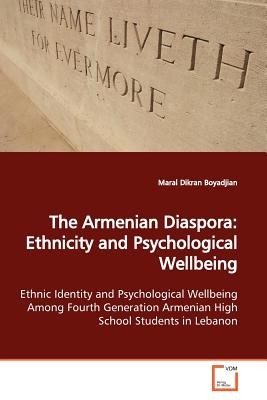
- We will send in 10–14 business days.
- Author: Maral Dikran Boyadjian
- Publisher: VDM Verlag
- ISBN-10: 3639139380
- ISBN-13: 9783639139389
- Format: 15.2 x 22.9 x 0.6 cm, softcover
- Language: English
- SAVE -10% with code: EXTRA
Reviews
Description
For the past couple of decades, ethnic identity and psychological well-being have been the concern of many societies in the West as a result of perceived threats to the ethnicity and professed vulnerability of self-esteem among ethnic minority groups. The preservation of ethnic identity has also been an issue of vital importance for many psychologists and educators concerned with the psychological well- being of individuals. Thus, the purpose of this study was to investigate the relationship between ethnic identity and psychological well-being in particular, self-esteem among fourth-generation Armenian high school students in Lebanon as measured by the English or Armenian translated Multigroup Ethnic Identity Measure (MEIM) and the Rosenberg Self-Esteem Scale (RSES). The study also assessed the dimensionality of two of the Armenian translated scales, the MEIM and the Self-Liking/Self-Competence Scale (SLCS). The entire sample consisted of 648 students and a sub sample consisted of 525 students who answered the questionnaires only in Armenian.
EXTRA 10 % discount with code: EXTRA
The promotion ends in 16d.14:48:51
The discount code is valid when purchasing from 10 €. Discounts do not stack.
- Author: Maral Dikran Boyadjian
- Publisher: VDM Verlag
- ISBN-10: 3639139380
- ISBN-13: 9783639139389
- Format: 15.2 x 22.9 x 0.6 cm, softcover
- Language: English English
For the past couple of decades, ethnic identity and psychological well-being have been the concern of many societies in the West as a result of perceived threats to the ethnicity and professed vulnerability of self-esteem among ethnic minority groups. The preservation of ethnic identity has also been an issue of vital importance for many psychologists and educators concerned with the psychological well- being of individuals. Thus, the purpose of this study was to investigate the relationship between ethnic identity and psychological well-being in particular, self-esteem among fourth-generation Armenian high school students in Lebanon as measured by the English or Armenian translated Multigroup Ethnic Identity Measure (MEIM) and the Rosenberg Self-Esteem Scale (RSES). The study also assessed the dimensionality of two of the Armenian translated scales, the MEIM and the Self-Liking/Self-Competence Scale (SLCS). The entire sample consisted of 648 students and a sub sample consisted of 525 students who answered the questionnaires only in Armenian.


Reviews